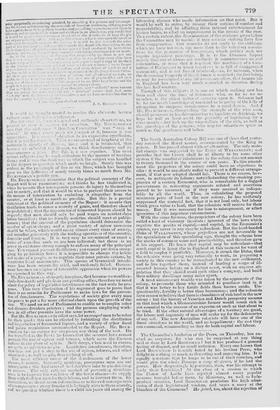The South Australian Colony Bill was one of ilsose that
yester- day received the Royal assent, communicated Ly the King in person. It has passed almost without alteration. The only mate- rial change was sugeested by the Doke of WELLINGTON; and provides that the Crown shall be at liberty to try some other system if the nutnber of inhabitants in the colony does not amount to twenty thousand in the course of ten years. To this amend- ment the projectors of the colony could have no objections to offer: it would be manifestly unfair to prevent a different arrange- ment, if that now adopted should fail. There is no reason, how- ever, to anticipate its failure; notwithstanding the croaking pro- phecies of a certain Economist, who is remarkable for a dogged perseverance in reiterating arguments refuted and assertions proved to be incorrect, as if they were received as indispu- table by all the world. Thus, in calculating the proposed minimum price of land in the new colony, he has uniformly suppressed the material fact, that it is not land only, but labour which gives value to land, that the colonists will receive for their money. But it was necessary for him to misrepresent, or affect ignorance of this important circumstance. With the same fairness, the proprietors of the colony have been called a knot of visionary theorists ; ignorant of the laws which regulate the profits of capital,—and capital, in the Economist's opinion, can never in any case be redundant. But the hard-headed Duke of WELLINGTON, whose prejudices are not favourable to the speculatists of this speculating age, thought the scheme bore the marks of corm-non sense and practicability, awl therefore gave it his support. He knew that capital may be redundant—that. much capital is lying idle in England at this moment for want of a field to employ it profitably. Moreover, it struck the Duke, that the colonists were going very rationally to work, in preparing a society in this country to be transplanted to the new settlement, and to live together there, instead of landing a cargo of ill- assorted human beings on a distant coast, with an express sti- pulation that they should avoid each other's company, and build their solitary dwellings many miles apart.
A most unnecessary trouble was taken by the opponents of the colony, to persuade those who intended to purchase land in it that it was better to buy fertile fields than barren sands. Un- questionably, fertility is better than barrenness; and the colonists have reason to believe that there is abundance of rich land in the new colony : but the history of Venetian and Dutch prosperity assures us that land which a Gloucestershire farmer would count rich is not essential to the success of an experiment such as that about to
be tried. If the other natural advantages of a territory are great, the labour and ingenuity of men will make up for the deficiencies of any soil. The new Australian colorists will have one of the finest situations in the world, and no impediment : the rest they can command, commanding as they do both capital and labour.


















 Previous page
Previous page